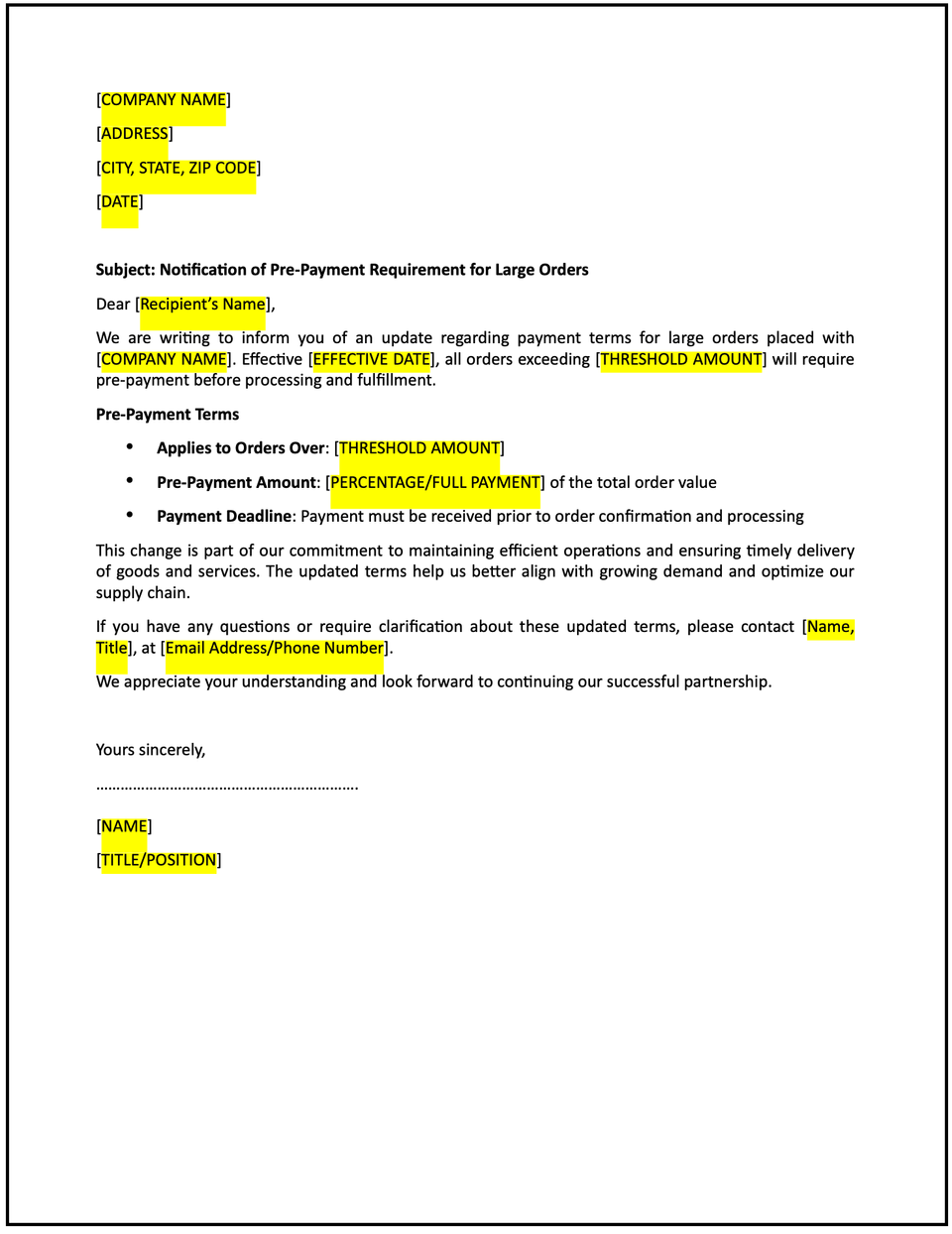Letter of pre-payment requirements for large orders: Free template

Letter of pre-payment requirements for large orders
A notification letter of pre-payment requirements for large orders is a formal communication used to inform customers about a new policy requiring advance payment for high-value purchases. This letter outlines the policy, explains its purpose, and provides instructions to ensure transparency and maintain a strong customer relationship.
How to use this letter of pre-payment requirements for large orders
- Open with acknowledgment: Begin by addressing the customer respectfully and referencing their account or recent transactions, if applicable.
- Announce the new requirement: Clearly state the introduction of pre-payment requirements for large orders and define what qualifies as a large order.
- Provide the rationale: Briefly explain why this policy is being implemented, such as mitigating financial risk, ensuring timely fulfillment, or streamlining operations.
- Highlight the impact: Specify how the change will affect the customer and any adjustments they may need to make when placing large orders.
- Include implementation details: Mention the effective date of the policy and any conditions or exceptions that may apply.
- Offer instructions: Provide clear steps for making pre-payments, including payment methods and deadlines.
- Reassure the customer: Emphasize that this change is designed to improve the ordering process and ensure better service.
- Maintain a professional tone: Ensure the letter is clear, polite, and focused on fostering understanding.
- Provide contact information: Include details for the customer to reach out with questions or for assistance in navigating the new requirements.
Benefits of using a letter of pre-payment requirements for large orders
This letter ensures clear and professional communication about the new policy while fostering trust and understanding. Here’s how it helps:
- Promotes transparency: Clearly outlining the policy and its purpose builds trust and reduces confusion.
- Reflects professionalism: A well-crafted letter demonstrates respect and attentiveness to customer needs.
- Encourages compliance: Providing clear instructions ensures customers can easily adapt to the new policy.
- Supports risk management: Communicating pre-payment requirements minimizes financial risks and ensures smoother transactions.
- Maintains relationships: Clear and proactive communication helps preserve goodwill and trust.
Tips for writing an effective letter of pre-payment requirements for large orders
- Be specific: Clearly describe the pre-payment requirement, including what qualifies as a large order and the effective date.
- Use professional language: Maintain a respectful tone to encourage understanding and cooperation.
- Highlight next steps: Provide actionable advice, such as payment methods and deadlines for pre-payment.
- Address potential concerns: Offer reassurance and support for customers adjusting to the new policy.
- Keep it concise: Focus on the key points while ensuring the tone is professional and customer-focused.
Frequently asked questions (FAQs)
Q: What details should I include in this letter?
A: Include the pre-payment requirement, the definition of a large order, the rationale for the change, and instructions for compliance.
Q: Should I personalize the letter?
A: Yes, addressing the customer directly ensures clarity and demonstrates attentiveness.
Q: Who typically sends this letter?
A: The finance, sales, or customer service department usually sends this letter.
Q: How formal should this letter be?
A: The tone should be professional yet supportive, focusing on clarity and the customer’s needs.
Q: When should this letter be sent?
A: Send the letter well in advance of the policy’s implementation to allow customers sufficient time to adjust.
Q: Can this letter include exceptions to the policy?
A: Yes, mentioning exceptions or flexibility for certain cases can help address customer concerns.
Q: Is acknowledgment from the customer required?
A: While not mandatory, encouraging acknowledgment ensures customers are aware of the new requirements and can comply.
This article contains general legal information and does not contain legal advice. Cobrief is not a law firm or a substitute for an attorney or law firm. The law is complex and changes often. For legal advice, please ask a lawyer.


